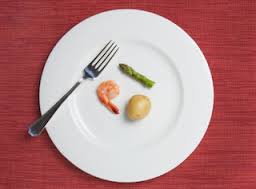The whole concept of calories in vs calories out has plagued the weight loss industry for decades. Programs like P90X and Weight Watchers want you to believe that if you just eat less calories then you burn you are guaranteed to lose weight. Sometimes, just this small change alone can help elicit fat loss success. However, for the vast majority of the population it is just not this simple.
The problem with operating on solely counting calories alone is that it can lead you down a dark and often metabolically damaging path. Most individuals have heard of the concept of BMR (basil metabolic rate) this is the amount of calories it takes for your body to just function on a day to day basis, if you were to sit on the coach and do absolutely nothing. There is a formula to estimate what this number is given your age, sex, weight, and height. From here you can estimate given your activity level how much more calories your body burns just to get through the day. From here the industry standard is to subtract 500 calories from this figure and now you have the amount you should eat everyday.
There are a few problems with this:
1) It doesn’t address muscle mass, as muscle requires more energy than fat to maintain. Hence, this will impact the amount of calories needed.
2) It doesn’t take into account the body type of the individual (ectomorph, endomorph, mesomorph).
3) It doesn’t address the huge impact hormones play in fat loss success, and how if a hormone is out of balance this can sabotage the chances of losing weight.
4) Finally, it doesn’t look at how the percentages of macros (protein, fat, and carbs) can make or break fat loss success.
It’s just not as simple as eat less and exercise more. Time and time again I see this with my clients and potential clients this plaguing mindset that they need to eat less or just exercise more. Now, don’t get me wrong, sometimes it is just lack of exercise or eating too much that is holding you back from achieving fat loss. However, what about those people that exercise everyday, eat very clean, yet they still can’t shed a pound. What are they doing wrong?
It is these people that will often fall into the trap of continuing to decrease their calories and exercise themselves into the ground. I cannot tell you how many times I have had to encourage my clients to eat more, because they were eating far too little. This is especially a problem with women. Somewhere along the way we heard this magic number of 1200 calories and think that is all we need to eat. I can tell you right now, that is way too low for 95% of the women out there.
The problem with eating too few of calories for your activity level is you create a metabolic disturbance in the body that in turn creates a stress response. Excessive calorie deprivation for months or more begins to plaque at your sympathetic nervous system, as your body thinks you are literally starving and begins to shut down systems in the body to keep you alive. A good indicator that this has happened to you is if you have plateaued for some time and you have some of the symptoms below:
feeling tired and sluggish
not thinking clearly
losing some hair and your skin may not look as good as it used to
taking longer to recover from injuries and workouts
catching colds more frequently
experiencing a low libido
experiencing GI symptoms that you never had before—bloating, burping, and
burning
experiencing premenstrual symptoms that you have not had previously
no longer menstruating
A safe calorie deprivation to have is between 300-500 calories, if you are taking into account everything else I mentioned before. When working with a client I look at the four points mentioned above before giving them a goal calorie number and daily percentage of macros to hit. Often times this alone will help them lose weight IF they stick to the numbers. However, sometimes this still doesn’t bring about success after a few weeks. Now keep in mind if a client loses between 1-2% body fat in the month that’s healthy progress. If the client is still plateaued I will inquire on their energy levels and cravings. Nine times out of ten, if sugar cravings have gone up, or energy levels have gone down then they need more calories, typically only a couple hundred more should do the trick. If that all checks out okay, it could be their sympathetic nervous system is stressed from too much exercise and too few calories.
If that’s the case I will have them do one or more of the following:
Reduce cardiovascular exercise or intensity
Decrease the intensity of their strength workouts
Encourage them to take long walks, introduce meditation, or yoga
Discuss their nighttime ritual and sleeping habits.
Manipulate their macros or calories
If you think you may have fallen victim to this excessive calorie deprivation or over exercise epidemic, I encourage you to reach out to me to schedule a consultation. We can problem solve together to get you on track towards your weight loss goals.



Leave a Reply